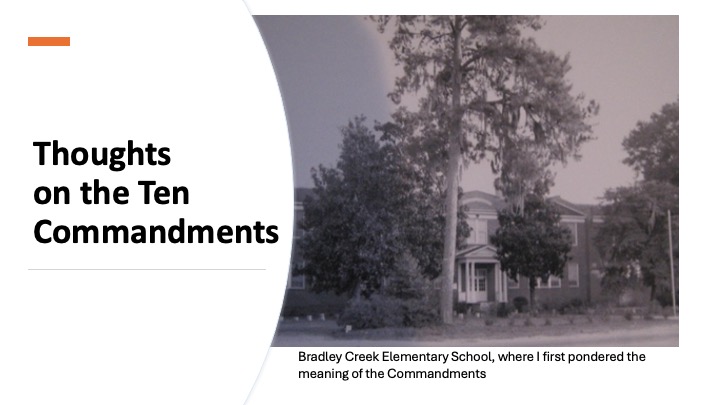In early June 1969, I graduated from the sixth grade. We even had a graduation banquet. The principal of Roland Grice Junior High, Mr. Mason, spoke. He told us there were two laws in the Bible that if we obeyed, we could slide through our next few years of schooling without an intimate meeting with his “Board of Education.” He had constructed this “board” from solid oak. Corporal punishment was still in vogue back in those days.
Then Mr. Mason asked if any of us knew which laws he was referring. Some girl’s hand, one who sat up front, shot up. Mr. Mason called on her.
“Do unto other’s as you’d have them do to you,” she answered.
Very good,” the principal said. “Anyone know the other law?”
At first no one answered, so he offered a clue. “It’s in the 10 Commandments.”
At this point, Jerry’s hand shot up. Mr. Mason called on him and he said, “Thou shall not commit adultery.”
The whole room erupted in laughter. Even though most of us only had a vague idea about what breaking the commandment meant, we were pretty sure it was the one commandment we’d probably not break during our seventh year of schooling.
Now, the state of Louisiana requires schools to display the 10 Commandments in classrooms. Some think this violates the separation of church and state. Maybe so, but it might also be an opportunity. Let me offer a suggestion for how teachers might engage their students using the commandments to learn about current events and human depravity.
An educational tool:
Each day, have the students to read a newspaper. Encouraging them to look for examples of how politicians and public officials break each of the commandments. This could be made into games using bingo-like cards. The class strives to find examples of broken commandment as the students individually compete to complete a straight row on their cards.
Think of the possibilities. It’d be easy to fill in the blank for the seventh commandment with the number of politicians sleeping around. But the eighth commandment would also be easy. Plenty of public servants have their hand in the government’s till. The ninth would also be a gimme for I know of no politician who doesn’t stretch the truth. And how about the politician who covets his neighbor’s house (or office) and breaks the tenth? Or the one who desires a graven image of someone or something they worship and breaks the second. The possibilities are endless.
Let’s encourage the students to let their imagination run wild. They’ll learn a lot! And in no time, politicians will clamber to the schoolhouses to pull down the commandments. But before then, the students will learn that the oratory ability has nothing to do with the truth, that we all fall short and should be humble, and that without God’s grace, we’re doomed.
The value of the Big Ten
Now don’t get me wrong. The 10 Commandments have great value. They provide us with a boundary in which we might enjoy the life God offers. I’ve done a lot of thinking about the commandments throughout my ministry. Below is an article of mine that appeared (in slightly different forms) in a newspaper and magazine back in 2003. But more important than the Big Ten, are the ultimate two commandments: love God and love your neighbor. And let’s not forget the Christian principle of humility. Bragging about keeping the commandments either breaks the ninth or trivializes them as we think higher of ourselves than we should. The Commandments should be humbling to us all.
And, if you are wondering, the answer to Mr. Mason’s question was the fifth commandment, “honor your father and mother.” It should also be easy to find examples of politicians breaking this commandment.
The Ten Commandments (2003)
A variation of article appeared in The Presbyterian Outlook, September 29, 2003, along with an opinion column in The Daily Spectrum, a newspaper published in St. George, Utah.
They’re marching in Alabama again. This time the destination is Montgomery and those who march support Judge Roy Moore’s fight to keep a granite monument of the Ten Commandments on the courthouse lawn. They removed the statue on August 27. It appears Moore and his supporters have lost, but they promise to keep fighting. Sooner or later, the United States Supreme Court will have to step up and rule, but so far, they’ve refused to handle this hot potato.
I’d sleep better if the Supreme Court decided such symbols acknowledge a foundation of Western law and are thereby an appropriate symbol that doesn’t violate the separation of church and state. Or maybe not. Of course, there are a variety of interpretations to what the founders of the Republic meant by such separation. As one who swore off the study of jurisprudence for theology, like the Supreme Court, I’ll pass on that potato.
Instead, let’s consider what the commandments are all about. The Big Ten provide a boundary by which we live as God intends, outlining that which enhances and destroys relationships. Theologians distinguish between two tables of the law, the first deal with how we relate to God and the second addressing our relationship with others. Put together, the two tables set the context for a society that honors God and other members of the human family.
In ancient times, Jewish rabbis supposedly placed a drop of honey on the tongues of those studying the law to remind them that God’s law is sweet, not bitter. Theologically, the law is understood as life-giving.
A few generations, Presbyterians and most all Christians spent more time studying the Ten Commandments. Preparatory lectures, focusing on the commandments, were held a few days before Communion so members could prepare themselves for the sacrament. The catechisms of our denominations as well as those of other denominations go into detail of the fuller meaning of each commandment. If you read the Heidelberg Catechism, you’ll discover “Thou shall not steal” includes no deceptive advertisings. And in the new Catholic catechism, acts leading to the enslavement of another human violates the commandment. In other words, we should be careful about misrepresenting a used car or purchasing Goods produced in a sweatshop.
“Thou shall not kill” also means more than not murdering someone. Martin Luther equated failure to feed the hungry, when you had the ability, with murder. Likewise, “bearing false witness” is more than just telling lies. The Westminster Catechism extended the commandment to exclude backbiting and vainglorious boastings, sins prevalent throughout society.
I could go on with examples of how we ignore each of the Ten Commandments, but I won’t. Every generation has a problem with lawlessness. Instead, we should understand that even if we have monuments by all courthouses or on every street corner, we wouldn’t necessarily become better citizens. It’s odd that about the time many churches de-emphasized the study of the catechism, granite and bronze memorials started popping up around the country.
In the 1950s, thousands of monuments were dedicated in the aftermath of Cecil B. DeMille’s’ blockbuster flick, “The Ten Commandments.” Today, we’ve lost the fuller understanding of the law while trivializing it into something chiseled on a rock. With the law publicly displayed, we prat ourselves on the back and brag about our piety while forgetting what the law is all about. Perhaps we should thank the ACLU. Maybe the publicity generated by these lawsuits will force us to understand that the commandments are not an image to be viewed. Instead, the law is to be studied. As both Moses and the prophets insist, written on our hearts (Deuteronomy 6:6, Isaiah 51:7, and Jeremiah 31:33).
Before marching off to Montgomery, take time to study the commandments. In the larger scheme of things, having a granite slab out in front of the courthouse won’t make a bit of difference. What will matter is who we apply the commandments. If we write them on our hearts as the Hebrew Scriptures encourage, rest assured they’ll be safe from an ACLU lawsuit.
Update on my 2003 opinion column:
The 10 Commandments for Mr. Moore, a former judge and politician, appears not to have weathered well. It was only for looks, as he had a problem with the seventh, which led to his downfall.

This school building burned down in 1982, long after I had moved on, which is a good thing for if it burned while I was a student, I may have been a prime suspect since we sang a little ditty about burning the school down.


I guess we’ll see how it goes. There are some people that are not happy about this new development though.
I really enjoyed this post, Jeff!
Thanks, Kelly
Timely posting.
Thanks, Jacqui!
Sage
Good meditation
timm
Thanks, Timm!
Ugh, Roy Moore. His little seventh-commandment issue did manage to get a Democrat elected to Congress here, barely, and for one term.
These days I miss the ramblings of your satirical alter ego. What was his name? Coyote Jack, or something.
Yep, Roy had his problems, like so many others. But today, no one seems to care. In my semi-anonymous days, my alter-ego was Nevada Jack, which was the name of a teddy bear I was given as I left for a student pastor position in Nevada.